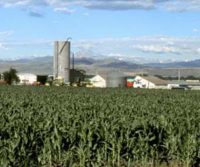Source: AP
The leaders in both parties on the House and Senate Agriculture committees have agreed to a one-year extension of the 2008 farm bill that expired in October, a move that could head off a possible doubling of milk prices next month. But House leaders have yet to say whether they will allow a vote on it.
Senate Agriculture Committee Chairman Debbie Stabenow, D-Mich., and House Agriculture Chairman Frank Lucas, R-Okla., announced Sunday that they had agreed on a last-minute extension that would extend the farm bill and replace dairy programs that expire at midnight Tuesday. Expiration of those dairy programs could mean higher milk prices at the grocery store within just a few weeks.
But the House GOP has yet to endorse the committees' extension agreement, and leaders are also considering two narrower extension bills: a one-month extension and an even smaller bill that would merely extend dairy policy. As of Sunday night, Republican leaders had not scheduled a vote on any of them.
The farm bill talks come as negotiators are still at an impasse on averting a broader fiscal cliff combination of higher taxes and spending cuts Jan. 1. Farm leaders had originally hoped to wrap the larger bill in a fiscal cliff deal.
A spokesman for House Speaker John Boehner said Sunday that Republican leaders had not decided how they would proceed on the farm extension, though a vote could come as soon as Monday.
One potential hurdle for the one-year extension is its cost: The nonpartisan Congressional Budget Office on Sunday estimated the extension, which also includes disaster assistance for farmers affected by drought, could cost more than $1 billion this budget year.
Boehner has pushed back on passage of a new five-year farm bill for months, saying there were not enough votes to bring it to the House floor after the House Agriculture Committee approved it in July. The Senate passed its version of a farm bill in June. The farm bill, generally passed every five years, includes domestic food aid, farm subsidies and other help for rural areas.
But the prospect of higher milk prices has prompted some action. Agriculture Secretary Tom Vilsack has said Americans face the prospect of paying $7 for a gallon of milk if the current dairy program lapsed and the government returned to a 1948 formula for calculating milk price supports.
Instead of just extending current dairy policy, the extension bill includes an overhaul of dairy programs that was included in both the Senate and House committee bills. The new dairy programs include a voluntary insurance program for dairy producers, and those who choose that new program also would have to participate in a market stabilization program that could dictate production cuts when oversupply drives down prices — an idea that hasn't gone over well with Boehner.
In July, he called the current dairy program "Soviet-style" and said the new program would make it even worse. Large food companies that process and use dairy products have backed Boehner, saying the program could limit milk supplies and increase their costs.
Stabenow blamed Boehner for getting to the point where an extension is the only option. "The lack of action by the House Republican leadership has put us in a situation where we risk serious damage to our economy unless we pass a temporary extension," she said.
One of the reasons Boehner has balked at bringing up a farm bill is disagreement among House Republicans over how much money should be cut from food stamps, which make up roughly 80 percent of the half-trillion-dollar bill's cost over five years. Lucas has unsuccessfully pushed his leadership for months to move on the legislation despite the disagreement over food aid.
On Sunday, Lucas said he hoped the extension would pass both chambers quickly as GOP leadership mulled their options.
"It is not perfect — no compromise ever is — but it is my sincere hope that it will pass the House and Senate and be signed by the president by Jan. 1," he said.
The extension would make modest cuts in a controversial farm subsidy known as direct payments, which pays farmers whether they farm or not. According to the CBO, the extension would cut $1.3 billion from the subsidy's $50 billion cost over 10 years. Both the House and Senate farm bills eliminated that subsidy completely.
The extension would also extend and pay for several farm bill programs that expired in October, from a small watershed rehab program to funding for rural "microentrepreneurs" to help for farmers' markets and organic producers. The bill budgets about $850 million for immediate disaster assistance, with most of that money going to livestock producers.

